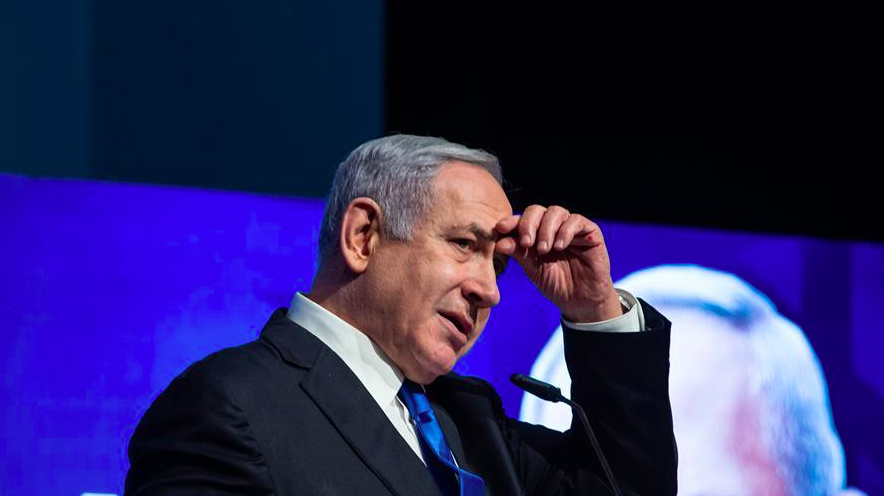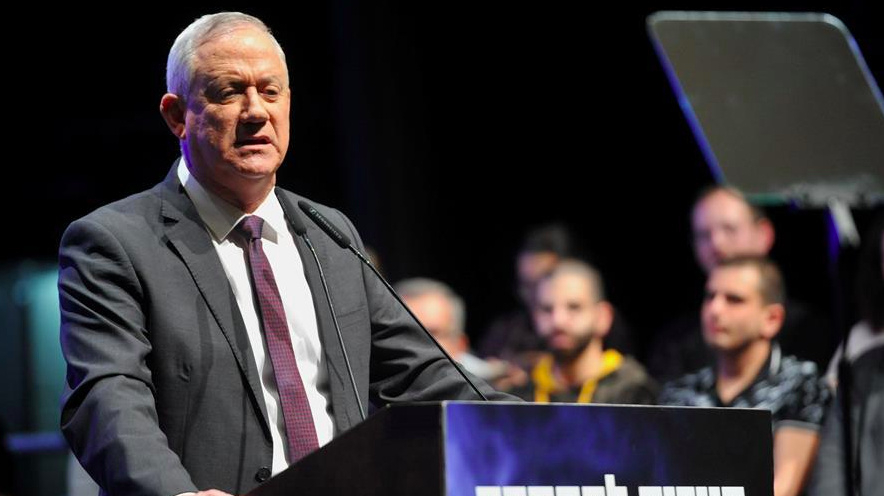
Israeli Prime Minister Benjamin Netanyahu takes part in a Likud Party election rally in Migdal Haemek, northern Israeli, February 25, 2020. /Xinhua
Israeli Prime Minister Benjamin Netanyahu takes part in a Likud Party election rally in Migdal Haemek, northern Israeli, February 25, 2020. /Xinhua
Editors Note: Stephen Ndegwa is a Nairobi-based communication consultant, and international affairs columnist. The article reflects the author's views, and not necessarily those of CGTN.
Israelis are going to the polls again on March 2, the country's third elections in a year after the April and September 2019 elections. Next month's elections for the 23rd Knesset, Israel's Parliament, is as a result of rival political parties' inability to form a government since last year's elections.
Although Prime Minister Benjamin Netanyahu won in the April elections, with his Likud Party garnering the most votes, he was not able to form a majority coalition in the Knesset. In the September elections the situation was similar, with the winning centrist Blue and White Party, led by Benny Gantz, a former military General, unable to form a coalition.
By all accounts the upcoming election is going to be a tight race. But this time there is a yearning to break the stalemate in order to enable the country move forward economically.
As usual, the man to beat is the incumbent. Although he is a man "with nine lives," politically speaking, this time the pressure seems too much, on and off the political space, for Netanyahu.
In November 2019 the prime minister was indicted on charges of bribery, fraud and breach of trust. Of course, he denied any wrongdoing, and called the action against him a politically motivated "witch-hunt."
Immediately after the indictment, Israel's opposition had made spirited attempts to take advantage of this apparent stripping down of Netanyahu's power. Some, like the Labor Party, filed petitions in the High Court to compel the prime minister to step down.
But Netanyahu pulled what seems to be his political ace card after he and U.S. President Donald Trump unveiled a new Middle East peace plan. Trump was also facing impeachment charges at the time, and it was hitting two birds with one stone.
Maybe it was a mere coincidence that surrounded the release of the latest peace deal, as both Trump and Netanyahu were facing impeachment charges. In fact, Netanyahu was already formally indicted for bribery and corruption, while Trump's impeachment hearings were on going in the Senate.
With such tensions in their countries, and with America set for elections on November 3, the timing of the peace accord, drafted in the last three years, was perfect. It portrayed the duo's role in guarding and enhancing global peace, in turn making their political detractors look petty or malicious.
The hyped peace plan, which was launched by both leaders in Washington, could have been aimed at appealing for support of the current regime in Israel. Any person opposing Netanyahu would be seen as anti-Semitic, and an enemy of the endangered Israeli nation.
Due to its corporate clout, the Jewish diaspora, particularly in America, is extremely influential. Over the years, this constituency has taken the rest of the world on a guilt trip in a bid to secure its interests, particularly in the Middle East.
Netanyahu is a favorite of this faction and may be the reason why he is the longest serving prime minister in Israel's history with over 13 years in office. Even now, the old guard would rather have him stay on, until such a time that they can get a "suitable" replacement; a person with mutual ideals for both home and abroad.
But Gantz, the 20th Chief of General Staff of the Israel Defense Forces from 2011 to 2015, is trying to claw back Netanyahu's pole position in Israel's political scene. Gantz seems to appeal to the young generation of voters, whose knowledge of Israel's tough past is scant, or insignificant.

Israel's Blue and White party leader Benny Gantz speaks during an election rally in the northern Israeli city of Haifa on February 11, 2020. /Xinhua
Israel's Blue and White party leader Benny Gantz speaks during an election rally in the northern Israeli city of Haifa on February 11, 2020. /Xinhua
This new generation sees Gantz as a symbol of Israel's future in a fast changing geopolitical landscape. They have different values than their parents, and have been greatly influenced by popular culture. Contrary to the hardened Netanyahu cohort, they seem ready to compromise and co-exist with their adversaries, if that is the only way they can enjoy everlasting peace.
Gantz can even use Netanyahu's analogy of the fact that Israel is a leader in innovation, with all the traditional industries having been replaced by new ones in the last decade. For the same reasoning, it could be the time to have a breath of fresh air on the political arena.
Gantz is also a shrewd political player. He attended the unveiling of Trump's peace plan in Washington D.C. His bone of contention through the Blue and White centrist coalition is Netanyahu's alleged corruption. However, he is accused of having no definite stand on policy issues.
In fact, recent reports paint Gantz as a sell-out. On February 27, the country's Channel 12 news published a recording of Gantz's top advisor putting into disrepute the Blue and White Party leader's intelligence and competence. According to the recording aired on TV, Bachar said that Gantz's refusal to permit a strike on Iran was "a threat to the people of Israel."
It still looks like a stalemate, which is a reflection of the State of Israel. Although Netanyahu still holds sway, last minute voters will decide whether the elections will tilt to the left or to the right. It will ultimately be a choice between retaining the old, albeit stable order, as symbolized by Netanyahu, or experimenting with the unknown and untested as embodied by Gantz.
(If you want to contribute and have specific expertise, please contact us at opinions@cgtn.com)